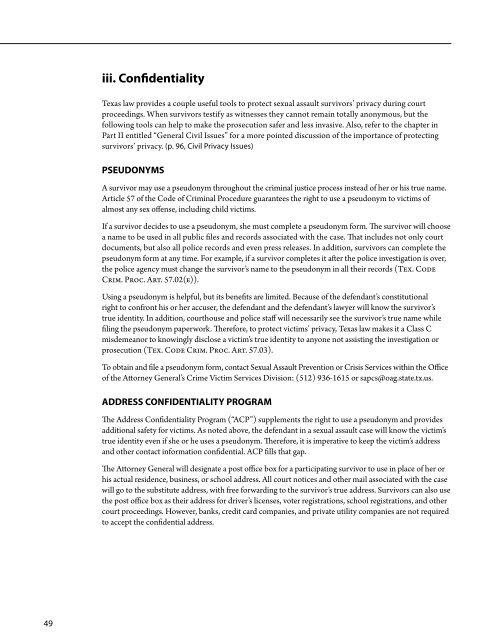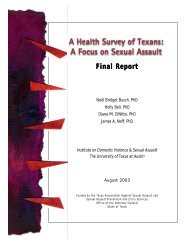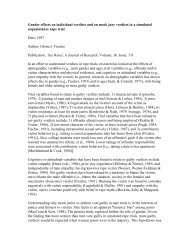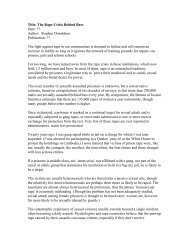Sexual aSSault LEGAL ADVOCACY MANUAL - Texas Association ...
Sexual aSSault LEGAL ADVOCACY MANUAL - Texas Association ...
Sexual aSSault LEGAL ADVOCACY MANUAL - Texas Association ...
You also want an ePaper? Increase the reach of your titles
YUMPU automatically turns print PDFs into web optimized ePapers that Google loves.
iii. Confidentiality<br />
<strong>Texas</strong> law provides a couple useful tools to protect sexual assault survivors’ privacy during court<br />
proceedings. When survivors testify as witnesses they cannot remain totally anonymous, but the<br />
following tools can help to make the prosecution safer and less invasive. Also, refer to the chapter in<br />
Part II entitled “General Civil Issues” for a more pointed discussion of the importance of protecting<br />
survivors’ privacy. (p. 96, Civil Privacy Issues)<br />
Pseudonyms<br />
A survivor may use a pseudonym throughout the criminal justice process instead of her or his true name.<br />
Article 57 of the Code of Criminal Procedure guarantees the right to use a pseudonym to victims of<br />
almost any sex offense, including child victims.<br />
If a survivor decides to use a pseudonym, she must complete a pseudonym form. The survivor will choose<br />
a name to be used in all public files and records associated with the case. That includes not only court<br />
documents, but also all police records and even press releases. In addition, survivors can complete the<br />
pseudonym form at any time. For example, if a survivor completes it after the police investigation is over,<br />
the police agency must change the survivor’s name to the pseudonym in all their records (Tex. Code<br />
Crim. Proc. Art. 57.02(e)).<br />
Using a pseudonym is helpful, but its benefits are limited. Because of the defendant’s constitutional<br />
right to confront his or her accuser, the defendant and the defendant’s lawyer will know the survivor’s<br />
true identity. In addition, courthouse and police staff will necessarily see the survivor’s true name while<br />
filing the pseudonym paperwork. Therefore, to protect victims’ privacy, <strong>Texas</strong> law makes it a Class C<br />
misdemeanor to knowingly disclose a victim’s true identity to anyone not assisting the investigation or<br />
prosecution (Tex. Code Crim. Proc. Art. 57.03).<br />
To obtain and file a pseudonym form, contact <strong>Sexual</strong> Assault Prevention or Crisis Services within the Office<br />
of the Attorney General’s Crime Victim Services Division: (512) 936-1615 or sapcs@oag.state.tx.us.<br />
Address Confidentiality Program<br />
The Address Confidentiality Program (“ACP”) supplements the right to use a pseudonym and provides<br />
additional safety for victims. As noted above, the defendant in a sexual assault case will know the victim’s<br />
true identity even if she or he uses a pseudonym. Therefore, it is imperative to keep the victim’s address<br />
and other contact information confidential. ACP fills that gap.<br />
The Attorney General will designate a post office box for a participating survivor to use in place of her or<br />
his actual residence, business, or school address. All court notices and other mail associated with the case<br />
will go to the substitute address, with free forwarding to the survivor’s true address. Survivors can also use<br />
the post office box as their address for driver’s licenses, voter registrations, school registrations, and other<br />
court proceedings. However, banks, credit card companies, and private utility companies are not required<br />
to accept the confidential address.<br />
49
















